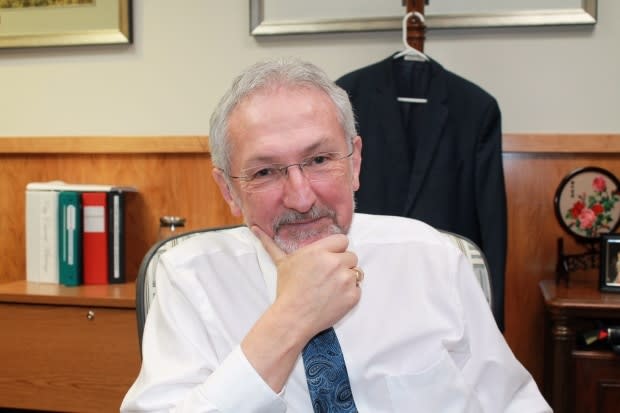Mayor wants B.C. to institutionalize severely mentally ill people who are homeless
There are people living on the streets of Nanaimo, B.C., who are incapable of taking care of themselves — but institutionalized mental health care would keep them safe, the city's mayor says.
The Vancouver Island city, which has a population of 100,000, has more homeless people per capita than any other municipality in the province, and Leonard Krog says the issue has consumed Nanaimo.
"I get nailed in the grocery store and even when I staff a Sally Ann kettle. That's what people want to talk about," Krog said.
"It is the conversation on everyone's lips and people are looking to the province and they're looking to the federal government to do something that is real."
Krog says the province is working to provide housing, but he says some of the estimated 600 people who live on city streets or who camp in parks and wooded areas need more help than what even supportive housing provides.
"The great complication in all of this is the significant number of people with severe mental health issues who are extremely difficult to house," he says.
He argues that institutions are the best solution for those people.

Krog is calling on the province to re-open places like Riverview, a former psychiatric hospital in Coquitlam, B.C., where patients would not have control over their own affairs, and would not have the ability to come and go as they pleased.
But he said he would like such facilities in communities across the province, including his own, so residents could be close to family.
Krog says it may sound harsh, but he thinks it's the compassionate solution to a problem that now sees some people living and dying on the streets.
'We are taking a very hard look'
Mental Health and Addictions Minister Judy Darcy said the government is considering ways to provide services for people who are seriously mentally ill and also addicted to substances.
"We certainly did see a phenomenon a number of years ago, when places like Riverview were closed and other institutions were closed across the province, of people with severe mental challenges being released into the community without the support that they needed and we see some of the results of that today," she said in an interview.
Those with brain damage from an opioid overdose is an example of someone who may need long-term support, Darcy said.
"We are taking a very hard look at what it means to provide the supports that those people need," she said, adding that could mean supportive housing that provides mental health and addictions support.
Darcy said patients at the former Riverview facility did not always get the support or quality of life they needed so the province is working to provide care that meets the needs of those it's aiming to help.

'Shameful history of institutionalizing people'
Laura Johnston, a lawyer with the Community Legal Assistance Society in Vancouver, represents people who have mental illnesses and mental disabilities, often because they have been detained under the Mental Health Act.
"B.C. has a shameful history of institutionalizing people with all kinds of mental diagnoses and mental disabilities and there's well documented evidence that very serious human rights abuses occurred in those institutions," she said.
She also points out that, just because places like Riverview have closed, it doesn't mean B.C. has stopped institutionalizing patients. She says she has clients who have been involuntarily admitted to hospitals and other mental health facilities and kept there for years.
"I go in and out of these facilities," Johnston says, "and I see people tied spread-eagle to their beds. It's disturbing."
Johnston says if institutions were the answer, the problem would have been solved by now. Instead, she'd like an overhaul of the Mental Health Act, so that people can't be detained and disciplined against their will.


